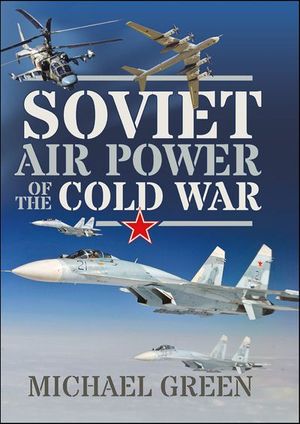Soviet Air Power of the Cold War
Published by Pen & Sword Books
"...a praiseworthy examination of the evolution of the Soviet air force throughout the Cold War." — Journal of Military History
At the peak of the Cold War in the 1950s the Soviet Union possessed some 12,000 aircraft, making it the largest air force of all the protagonists. By the 1990s this had declined to around 8,000, the reduction largely reflecting the increase in aircraft capability. As well as fighters and bombers, the Soviet inventory included trainers, transports, seaplanes, electronic warfare and ground attack aircraft, as well as an impressive helicopter fleet, notably the Mi-24 ‘Hind’ gunship and the massive Homer transport. The Tu-4 ‘Bull’ was the first Russian nuclear-capable bomber, a copy of the US B-29, which was followed by their range of jet bombers, the Il-28 ‘Beagle’, Tu-16 ‘Badger’ and M-4 ‘Bison’. The prop driven Tu-20 ‘Bear’ and its successors including the Tu-22 ‘Backfire’ and finally the Tu-160 ‘Backfire’, were all formidable. The jet-engined MiG-15 fighter entered service in 1948 and proved itself during the Korean War. The MiG-17, MiG-19 and MiG-21 followed . Ground-attack aircraft included the Su-7 ‘Fitter’ and M-23 ‘Flogger’. The 1970s saw the MiG-25 ‘Foxbat’ interceptor, followed by the MiG-29 ‘Fulcrum’ and Su-27 ‘Flanker’, coming into service. All these aircraft and many more are authoritatively described and vividly illustrated in this comprehensive work.
At the peak of the Cold War in the 1950s the Soviet Union possessed some 12,000 aircraft, making it the largest air force of all the protagonists. By the 1990s this had declined to around 8,000, the reduction largely reflecting the increase in aircraft capability. As well as fighters and bombers, the Soviet inventory included trainers, transports, seaplanes, electronic warfare and ground attack aircraft, as well as an impressive helicopter fleet, notably the Mi-24 ‘Hind’ gunship and the massive Homer transport. The Tu-4 ‘Bull’ was the first Russian nuclear-capable bomber, a copy of the US B-29, which was followed by their range of jet bombers, the Il-28 ‘Beagle’, Tu-16 ‘Badger’ and M-4 ‘Bison’. The prop driven Tu-20 ‘Bear’ and its successors including the Tu-22 ‘Backfire’ and finally the Tu-160 ‘Backfire’, were all formidable. The jet-engined MiG-15 fighter entered service in 1948 and proved itself during the Korean War. The MiG-17, MiG-19 and MiG-21 followed . Ground-attack aircraft included the Su-7 ‘Fitter’ and M-23 ‘Flogger’. The 1970s saw the MiG-25 ‘Foxbat’ interceptor, followed by the MiG-29 ‘Fulcrum’ and Su-27 ‘Flanker’, coming into service. All these aircraft and many more are authoritatively described and vividly illustrated in this comprehensive work.
BUY NOW FROM
COMMUNITY REVIEWS

